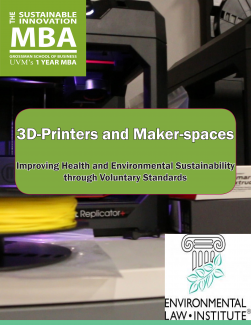Since moving to Washington almost 40 years ago, I’ve had two main editorial gigs. In addition to my current post, I was editor of the American diplomats’ magazine, the Foreign Service Journal, during the Reagan years. Most of the Journal’s audience are Foreign Service officers, who sign after their names, “Esq.” Most of The Environmental Forum’s audience are lawyers, who also sign, “Esq.”
That was just an amusing coincidence between two professional magazines, but now both of the agencies they mainly cover, the State Department and the Environmental Protection Agency, have been threatened with having their budgets and staffs savaged. To date, Congress hasn’t gone along, but the danger is causing poor morale at these agencies and hundreds to already quit voluntarily. As these workers’ longtime chronicler, critic, and champion, I feel compelled to respond.
It seems the esquires and other professionals at State and EPA are now deemed to be a “deep state” conspiring to its own ends and disloyal to the new administration and its policy priorities. Suspicion of career officials is not new, but over time all previous presidents have come to respect the civil service; they recognize that, bureaucratic inertia aside, its ranks are loyal to their country and eager to carry out mandates designed to better the lot of Americans.
A cost-benefit analysis of American diplomacy would note that since the end of World War II, an unprecedented era of worldwide peace and prosperity has grown and endured. Experienced diplomats established the financial and trade institutions that underpinned a huge expansion in wealth driven by improvements implemented by workers, business, and agriculture. Since 1960, global per capita GDP has increased 22 times in constant dollars. Human life spans have leaped from 48 years in 1950 to 71 years in 2015 — and a decade more in developed countries.
Professional diplomats were also at the epicenter during the Cold War and kept the pressure on the Soviet Union via containment until it collapsed. And the Foreign Service helped create the military alliances whose might created the environment for that implosion.
The Foreign Service can only take partial credit, for helping to create the framework and oiling the gears, but the United States has benefited hugely from its tiny investment in fielding a professional diplomatic corps whose numbers couldn’t even fill a hockey arena.
Now the international system they have helped to build is subject to attack. “Other presidents have understood,” the Washington Post said, “that the United States has gained, disproportionately, from a system in which it helps keep the peace without keeping crabbed accounts on its national ledger.” The same can be said about Trump’s attacks on the world trading system, where he sees other countries as robbing the American “piggy bank.” He blames the situation he beholds on his Oval Office predecessors and especially the weak professionals at State.
According to Foreign Policy, a Trump acolyte in the department is combing through social media to compile a list of officials who have supposedly been disloyal. Trump has experienced diplomats processing FOIA requests and has refused to name ambassadors to key countries or to fill other crucial posts. Trump also nearly tweeted away diplomatic immunity, exposing our government workers to real danger.
The fact that 99 percent of foreign affairs — of maintaining “our first line of defense” — is at the level of daily transactions among professionals serving in hundreds of countries has not occurred to him. Or as Defense Secretary James Mattis has said, if State’s budget is reduced, “Then I need to buy more ammunition.” But when asked about Trump’s proposal for a 30 percent cut, Secretary Mike Pompeo said cryptically, “I’ll make sure we have every single dollar we need and not one dollar more.”
Likewise, EPA is a useful and good agency Trump wants to ravage to upend its successes. The benefits of environmental protection have vastly outweighed the cost to American businesses and taxpayers, by between $113-741 billion a year, according to 2014 OMB data. Yet Trump and his first agency administrator came into office seeing the skilled professionals who helped accomplish this as an enemy — it was time to “deconstruct the administrative state.”
Scott Pruitt began the process by measuring his success using a different yardstick than his predecessors: beating down the professionals who dutifully implement and enforce the statutes passed by Congress and signed by the president, as detailed and directed under law and under careful court scrutiny. “When you look at what’s going on at the EPA, that agency has been a bastion of liberalism for years and years and years,” Pruitt told a radio host. He said the agency “was weaponized historically” against business. Representative Betty McCollum (D-MN) countered, “‘Staff has been under attack during your tenure’ and ‘there’s documented retaliation, as far as I’m concerned,’” according to the Washington Post. In fact, “the U.S. Office of Special Counsel is investigating whether . . . Pruitt retaliated against staffers who questioned his spending and management decisions.”
Pruitt is gone. According to E&E News, acting Administrator Andrew Wheeler “has signaled an increase in press access and engagement with career staff,” both principles that were anathema to his predecessor. And at State, Pompeo, who succeeded the dour institutional decimator Rex Tillerson, is said to be more popular among the Foreign Service employees and other civil servants who staff the department headquarters and overseas posts.
If they care to listen to professionals who want nothing more than to uphold their oaths of office, Wheeler and Pompeo will be well served in implementing the president’s policies.
Notice & Comment is written by the editor and represents his views.
Critics Call Bailout of Coal, Nuclear Plants “Trump Socialism”
The Trump administration’s plan to bail out the beleaguered nuclear and coal industries continues to draw sharp reaction from critics, with activists now claiming it will cost Americans as much as $34 billion more a year for electricity.
Meanwhile, Howard Learner, executive director of the Chicago-based Environmental Law & Policy Center, claims the directive that was announced June 1 is largely a result of lobbying on behalf of FirstEnergy Corp. by President Trump’s former campaign manager, Corey Lewandowski. . . .
Murray Energy is a major mining company that supplies coal to many affected power plants.
“Clearly, FirstEnergy and Bob Murray of Murray Energy have been aggressively lobbying the Trump administration for a bailout,” according to Mr. Learner, who said the directive would interfere with the marketplace to ensure cash flow for executives from noncompetitive corporations.
“President Trump is asking the public to subsidize the losers,” Mr. Learner said.
Former U.S. Nuclear Regulatory Commission board member Peter Bradford [said], “This is about favors and political paybacks. . . . It’s not Bernie Sanders socialism. It’s Trump socialism, because the benefits aren’t going to the public at large.”
— The Toledo Blade
“Scott Pruitt’s . . . claim that benefits have been inflated in EPA regulatory decisionmaking is simply not borne out by the facts, and in today’s far-reaching announcement, he is doing nothing short of cooking the books so that polluters always win, and people always lose.”
— Sara Chieffo, vice president of government affairs, League of Conservation Voters
The Tragedy of the Commons Writ Large
Maybe planet-wrecking behavior is generic to technology, or so says astrophysicist Adam Frank, as reported in Popular Science. The venerable publication cites an article in a more obscure journal, Astrobiology, and notes, “A generic feature of any planet evolving a species that intensively harvests resources for the development of a technological civilization” is what biologists, geologists, and anthropologists call the Anthropocene, the era in which Earth’s environment has been shaped by humans.
“Frank borrowed from population ecology to devise models that represent the relationship between a civilization and its planet, using mathematical equations similar to those used by anthropologists to represent the rise and fall of ancient civilizations, like the one on Easter Island.” The result? “When you get advanced enough, and start consuming resources and energy at a fast enough clip you necessarily start to change your home planet on a global scale.”
Frank says that because of feedback loops that allow civilizations to respond to environmental stressors, dystopia isn’t the necessary result. Disturbingly, however, it’s the immutable outcome in three out of four scenarios. He labels the three bad results on graphs showing the declines as either a gradual die off, a brutal collapse without resource change, and a still severe collapse with resource change. In other words, if humanity does nothing, we all die, either in a cataclysm or slowly. But even if we do alter course, chances are the collapse still occurs.
The fourth outcome is sustainability. Strangely, the popular magazine doesn’t define what that means or how to get there, which makes sense because The Environmental Forum has also puzzled over sustainability. It would appear that humanity needs to recognize its resource constraints, but faster and more aggressively than in the outcome in which constraints are recognized but there is still a collapse.
But let’s not fault Popular Science here for not describing sustainability. Gro Brundtland laid down the challenge to humanity in 1987’s Our Common Future. Her definition suffers from tautology, however: sustainability is living such that you do not deprive succeeding generations of the resources they will need. Maybe surviving means we sustain the means of survival.
Right now we are using resources at a rate equivalent to two planet Earths, so we are outside Brundtland’s boundary. That is a challenge to environmental professionals, who are in the best position to inform policymakers and the public about defining sustainability and how to get there.
Christie Manning is an assistant professor of environmental studies and psychology at Macalester College whose field encompasses “how people respond to information about climate change.” She says, “If you want to encourage action, fear is often counterproductive.” Further, it “narrows our thinking and makes us less willing to work with those who are different.”





